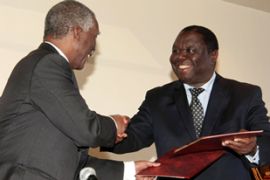Zimbabwe rivals agree cabinet posts
Opposition MDC and Mugabe’s Zanu-PF set to sign power-sharing deal.

Control of police
The opposition has demanded control of the police while agreeing to Mugabe, Zimbabwe’s president, retaining control of the military.
|
“This is undoubtedly historic, but we still have a long and treacherous road to travel” David Coltart, opposition legislator |
Both the police and military have been blamed for state-orchestrated violence and torturing Mugabe’s opponents.
Zanu-PF, the MDC and the smaller opposition grouping of Arthur Mutambara met in Harare on Saturday to work on cabinet appointments before a meeting of Mugabe’s politburo, his party’s top policy body, ZBC said.
David Coltart, an opposition legislator, said in a message to his supporters the first task lying ahead was for the Harare parliament to pass a constitutional amendment forming a new power-sharing government.
It will enable the administration to urgently start work, he said.
‘No absolute power’
The new government will keep Mugabe as president with greatly reduced powers along with two largely ceremonial vice presidents drawn from Zanu-PF.
Tsvangirai becomes prime minister with two opposition deputies, Coltart said.
“Although he [Tsvangirai] does not have absolute power, he does have substantial power,” he said.
“This is undoubtedly historic but we still have a long and treacherous road to travel.”
Virtually all of the cabinet ministers to be appointed by the opposition “have, at some stage in the past nine years, been brutalised on the instructions of those they will now have to work with,” said Coltart.
‘Highly polarised’
Mugabe will still chair the cabinet, with Tsvangirai will sit as vice chair.
But the opposition leader heads a council of ministers that will supervise the work of the cabinet, Coltart said.
“Zimbabwe remains highly polarised and it will take statesmanship on all sides to make this work,” he said.
The compromise over the dual roles of Mugabe and Tsvangirai broke a deadlock that threatened to fail the power-sharing talks that began in June.
It reflects the votes cast for their different parties in March 29 elections.
Poll ‘sham’
In parliamentary voting, Zanu-PF got slightly more votes, but not the most parliament seats.
In presidential polling, Tsvangirai did not win enough votes to avoid a runoff against Mugabe.
State-sponsored violence against Tsvangirai’s supporters led him to boycott the presidential runoff and Mugabe was declared the overwhelming winner of the second vote widely denounced as a sham.
Long-simmering and major differences between the two sides and the nation’s worsening economic collapse are expected to put the power-sharing deal under massive pressure.
Hours before the accord was announced, Mugabe told a meeting of loyal tribal chiefs he would never allow the opposition “to govern this country”.